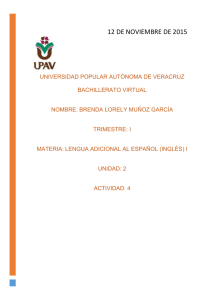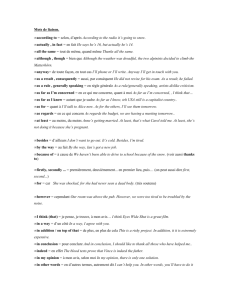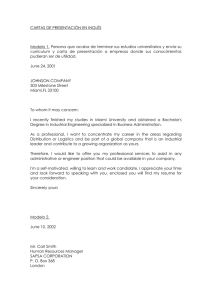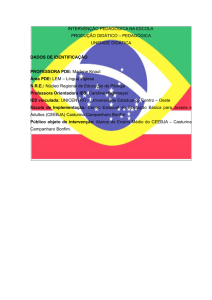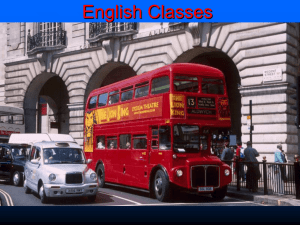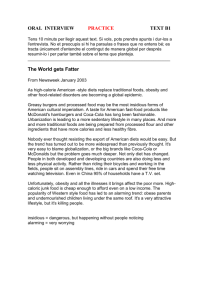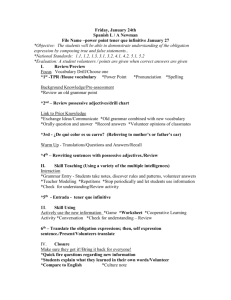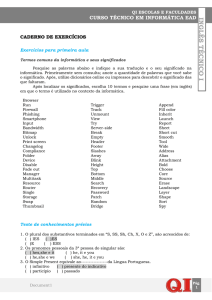text: to commute or not to commute, that is the question
advertisement
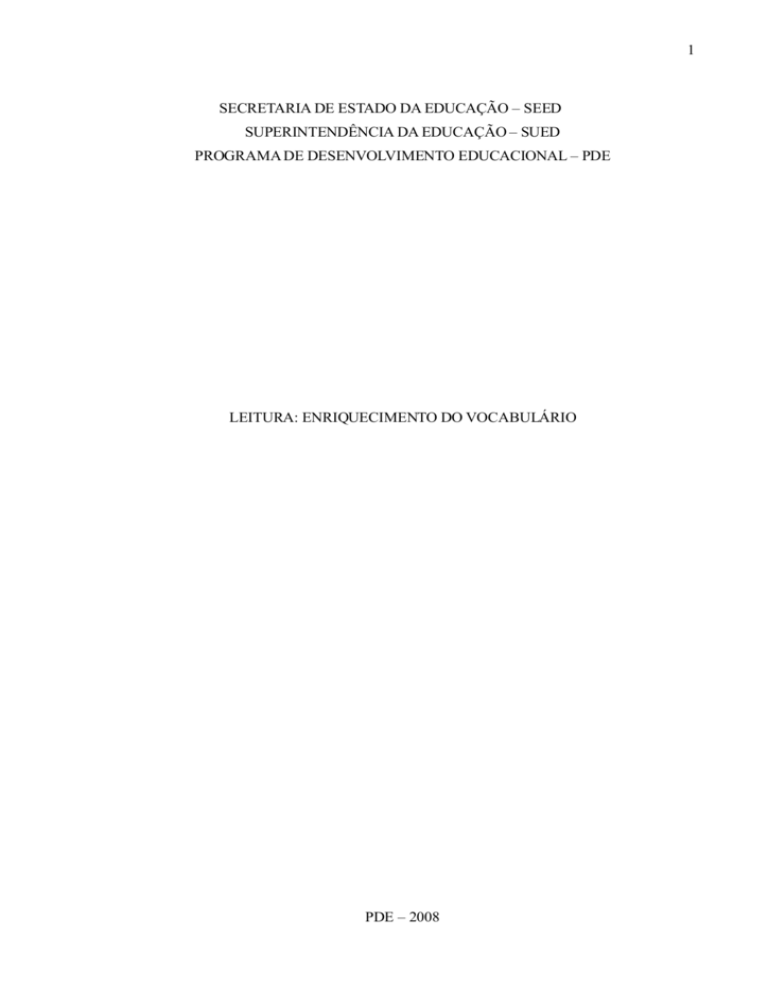
1 SECRETARIA DE ESTADO DA EDUCAÇÃO – SEED SUPERINTENDÊNCIA DA EDUCAÇÃO – SUED PROGRAMA DE DESENVOLVIMENTO EDUCACIONAL – PDE LEITURA: ENRIQUECIMENTO DO VOCABULÁRIO PDE – 2008 2 SECRETARIA DE ESTADO DA EDUCAÇÃO – SEED SUPERINTENDÊNCIA DA EDUCAÇÃO – SUED PROGRAMA DE DESENVOLVIMENTO EDUCACIONAL – PDE LEITURA: ENRIQUECIMENTO DO VOCABULÁRIO Trabalho apresentado como pré – requisito parcial para o PDE, a ser desenvolvido no plano de intervenção pedagógica no Colégio Estadual D. Pedro I – EFMPN, sob a orientação da Profª. Ms. Caroline Pupo Hagemeyer. PDE – 2008 3 UNIDADE DIDÁTICA LEITURA: ENRIQUECIMENTO DO VOCABULÁRIO PROFESSORA PDE-2008: LUCI NOELI SCHROEDER PROFESSORA ORIENTADORA: CAROLINE PUPO HAGEMEYER NRE: NÚCLEO REGIONAL DE PITANGA MUNICÍPIO: PITANGA ESCOLA: COLÉGIO ESTADUAL D. PEDRO I –EFMPN DISCIPLINA: LÍNGUA INGLESA INSTITUIÇÃO DE ENSINO SUPERIOR: UNICENTRO LIGHTBOWN, P.M. & SPADA, N. How languages are learned. Oxford University Press, 2006. Dear Teacher: To define the subject of study as lexical acquisition as a support to build the discourse in the English language teaching, we searched teorical knowledge that can arouse the student’s interest to read in English and take him/her to acquire new vocabulary through letters, colors, sounds, images. Through this, helping him to understand the text and, consequently, to build his/her vocabulary. The Diretrizes Curriculares da Rede Pública do Estado do Paraná (2006), say: “o texto como unidade de linguagem em uso, ou seja, de comunicação verbal- escrita, oral ou visual – será o ponto de partida da aula de Língua Estrangeira. Acredita-se que o texto despertará o interesse dos alunos para que possam desenvolver uma prática analítica e crítica, ampliando seus conhecimentos lingüísticos e, também, percebendo as implicações sociais, históricas e ideológicas presentes num discurso.” ( p. 44-45) Like this, the project will be developed at high school. This pedagogical notebook is divided in 5 units, prioritizing the vocabulary and text’s study, when presuppose that the meaning of the text isn’t ready when we read it, and the student will build it through his/her previous knowledge. In this way, it will be shown texts from different genres and several subjects using pictures, cartoons, letters, etc, highlighting the importance of visual literacy as a skill more and more present in the modern society. Therefore, according to Buratini (2004), the visual reading can help to fill possible gaps of understanding from linguistic unfamiliarity. So we observed in the classroom the trouble to practice the English language reading and, consequently, to understand and build the sense of the text, because the reader faces the barrier of unknown word. Due to this,it appeared the student’s necessity to study vocabulary in the teaching of reading, because it is part of his/her process of intellectual growth and his familiarity with the language. In this way, through reading and vocabulary activities, we intend to give students support to the reading and interpretation of non-verbal texts. So, the visual attracts attention, but it is still necessary to emphasize the importance of visual to the understanding of reading in a foreign language. Thus, the student needs captivating subjects and stimulating texts like tasks that help him/her to read and to build vocabulary. Therefore the key to encourage the student to read is motivating him/her with accessible material and tasks he/she can carry out. 5 Caro aluno: Você sabe que a linguagem é muito importante, pois é por meio dela que interagimos com outras pessoas, demonstrando toda forma de sentimento, de opinião, informação e de ideologia. Como também, a língua inglesa é muito importante, porque através dela temos oportunidades de conhecer outras culturas e ideologias. Desse modo, este caderno pedagógico será constituído de várias unidades, elaboradas por diversos professores. Esta unidade especificamente será composta por 5 atividades de leitura e aquisição de vocabulário. O papel do vocabulário no ensino da leitura é fundamental, porque o leitor em língua estrangeira enfrenta a barreira da palavra desconhecida. Assim apresentar-se-á textos de diferentes gêneros e assuntos diversos, levando-o a criar o seu próprio discurso. Os textos desta unidade são todos muito interessantes e se apresentam de várias formas, visando despertar o seu interesse tanto pelo vocabulário básico quanto pelo vocabulário novo. Destaca-se também a leitura, na qual você poderá grifar as idéias principais, facilitando a compreensão para as tarefas propostas. Em vista disso, enfatizamos a importância do conhecimento da língua inglesa no mundo globalizado, demonstrando que a cada aula, aprendem-se novos vocábulos e expressões inseridas nos diferentes textos que lhe são apresentados. Assim, você passará boa parte do seu tempo utilizando este material. Tomara que você realmente aproveite todas as informações, explicações e atividades preparadas. BOM TRABALHO! 6 TEXT: TO COMMUTE OR NOT TO COMMUTE, THAT IS THE QUESTION? TASK 1: What kind of text is this? ( ) a poem ( ) a cartoon ( ) an advertisement ( ) an interview 2- Why did you choose this answer? ( ) É uma obra em verso com características poéticas. ( ) Sua estrutura é caracterizada por perguntas e respostas, envolvendo pelo menos dois indivíduos. ( ) É um gênero textual constituído de linguagem não verbal, podendo ou não trazer linguagem verbal. ( ) Rico em elementos de linguagem não verbal, com efeitos de sentido que podem ser alcançados por meio de planejamento gráfico, que inclui: cores, tipo de letra, imagem, etc. TASK 2: Match the columns. a) still ( ) limpo b) thought ( ) viajar uma distância considerável diariamente c) surrounded para ir trabalhar d) move back ( ) ainda e) be able ( ) do lado de fora f) worse ( ) mais barato g) clean ( ) pensava h) cheaper ( ) pior i) outside ( ) cercado, rodeado j) commute ( ) à venda k) for sale ( ) conseguir fazer algo ( ) mudar de casa, lugar TASK 3: Read the text and find words which mean: ____________________________ sobretudo, principalmente; ____________________________ razoavelmente, bastante; ____________________________ suficientemente, o suficiente; ____________________________ troca; ____________________________ próximo; ____________________________ na hora; 7 ____________________________ engarrafamento; ____________________________ lotado; ____________________________ auto-estrada; ____________________________ logo. TASK 4: Match the questions with the paragraph. To commute or not to commute, that is the question a) Have you ever tried going by car? b) How long have you lived there? c) Why did you choose this village? d) Why did you decide to live in the country? e) Why have you decided to move back to the city? ( ) Well, partly because houses are so much cheaper outside London, but mainly because I thought I could have the best of both worlds – live surrounded by trees and traffic-free streets but still be able to work in London. ( ) Because it’s still very rural, and is an hour from London by train. The cost of traveling seemed a fair exchange for a cheaper house, each access to good schools for my children, and clean air. ( ) For ten years. But I’ve had enough. My house is up for sale. I’m going to move back to London, to as close to my office door as I can reasonably manage. ( ) Well, the real problem with living outside London and having to commute there every day, as I discovered too late, is the daily journey to London. The trains are always crowded, they’re never on time, the journey is boring, and occasionally I’ve gone to sleep and missed my stop. ( ) Yes, but it’s even worse. What you get is miles of traffic jams on the motorway. Still, I hope that soon it won’t be my problem any longer. My one dream now is to be able to walk to work. OXENDEN,Clive & LATHAM-KOENIG, Christina with Gill Hamilton.English File Intermediate Workbook. Oxford University Press, 1999. 8 TEXT: COMMUTER Pre-Reading TASK 1: What are the good and bad things about traveling to work? ___________________________________________________________________________ ___________________________________________________________________________ ___________________________________________________________________________ ___________________________________________________________________________ ___________________________________________________________________________ TASK 2: Do you think it is important to arrive on time at work? Why? ___________________________________________________________________________ ___________________________________________________________________________ ___________________________________________________________________________ ___________________________________________________________________________ TASK 3: Are you concerned about time? Why? ___________________________________________________________________________ ___________________________________________________________________________ ___________________________________________________________________________ ___________________________________________________________________________ TASK 4: Look at this text but don’t read it yet. What do the illustration suggest to you? ___________________________________________________________________________ ___________________________________________________________________________ ___________________________________________________________________________ ___________________________________________________________________________ ___________________________________________________________________________ 9 Poema de Alan Maley publicado em Maley e Duff, The Inward Ear, Cambridge University Press, 1989. Commuter He lives in a house in the suburbs He rises each morning at six. He runs for the bus to the station, Buys his paper and looks at the pics. He always gets in the same carriage, Puts his briefcase up on the rack. Thinks miserably of his office, And knows he can never turn back. He gets to his by nine thirty, Wondering what he should do. When the coffee break comes at eleven, 10 He knows he still hasn’t a clue. His lunch break is quite uninspiring, He sits it out in the canteen. It’s fish and chips, mince and potatoes, A choice that’s quite literally obscene. At five he runs back to the station, Gets in the same carriage again, Unfolds his evening paper, Pulls a veil down over his brain. Poema de Alan Maley publicado em Maley e Duff, The Inward Ear, Cambridge University Press,1989. TASK 5: How can you tell that a text is a poem? ___________________________________________________________________________ ___________________________________________________________________________ ___________________________________________________________________________ TASK 6: How is it different from other texts? ___________________________________________________________________________ ___________________________________________________________________________ ___________________________________________________________________________ TASK 7: What do people write about in poems? ___________________________________________________________________________ ___________________________________________________________________________ ___________________________________________________________________________ TASK 8: Look at the words below and underline only the words you know and look the unknown words up in a dictionary. carriage – uninspiring – unfolds – house – paper – turn back – potatoes – morning – when – brain – station – pulls – lunch break – still – choice – gets – clue – veil – runs – rises – canteen – wondering – mince – miserably – buys – knows –– back – briefcase – rack – down – sits – desk – comes – looks 11 TASK 9: Give the meaning of the words below. choice – paper- briefcase- carriage- brain- clue- wondering- sits- runs- pulls- TASK 10: Write a sentence with these words. choice- ________________________________________________________________ carriage- ______________________________________________________________ wondering- ____________________________________________________________ clue- _________________________________________________________________ briefcase- ______________________________________________________________ TASK 11: Match the words with the meaning. a) turn back ( ) to have information about something. b) rack ( ) towards the ground or a lower point or in a c) down lower position. d) still ( ) to go in the opposite direction. e) buy ( ) not at all interesting or exciting. f) rise ( ) to cut food, especially meat, into very small g) brain pieces, usually in a machine. h) uninspiring ( ) to get something by paying money for it. i) know ( ) the organ inside your head that controls how j) mince you think, feel and move. ( ) a frame or shelf, usually with bars or hooks, for holding things on. ( ) up to a particular point in time and continuing at that moment. ( ) stand, to go upwards. 12 TASK 12: Give all the words in English that you can imagine are associated with the words below. E.g. lives: house, city, place, time,etc lunch- _________________________________________________________________ briefcase- ______________________________________________________________ back- _________________________________________________________________ pull- __________________________________________________________________ bus- __________________________________________________________________ TASK 13: Qual é o sentido da palavra suburbs na língua inglesa? ___________________________________________________________________________ ___________________________________________________________________________ ___________________________________________________________________________ TASK 14: Which is the meaning of the adverb miserably in the text? ___________________________________________________________________________ ___________________________________________________________________________ TASK 15: Obscene in the text means: ( ) dealing with sex in a socially unacceptable and offensive way, indecent. ( ) extremely immoral and unfair in a way that makes you angry. TASK 16: Read the text again and answer the questions below. The poem below express some negative feelings. Justify your answer with at least three sentences from the text. ______________________________________________________________________ ______________________________________________________________________ ______________________________________________________________________ ______________________________________________________________________ ______________________________________________________________________ ______________________________________________________________________ ______________________________________________________________________ 13 TASK 17: What is the text about? ______________________________________________________________________ ______________________________________________________________________ ______________________________________________________________________ ______________________________________________________________________ ______________________________________________________________________ TASK 18: Where does the man live? ______________________________________________________________________ ______________________________________________________________________ TASK 19: What does he do in the evening at home? ______________________________________________________________________ ______________________________________________________________________ ______________________________________________________________________ TASK 20: Look at the illustration and answer which negative feeling is associated the picture. ___________________________________________________________________________ ___________________________________________________________________________ __________________________________________________________________________ ___________________________________________________________________________ ___________________________________________________________________________ ___________________________________________________________________________ 14 Vocabulary Tip How can I remember new words? The way you record and learn a word helps you remember it. For example you can: - imagine the word. - write a personal example. - make a word map. - associate the word with a similar word in your language. But you can’t learn new words just by writing them down once. You have to revise them regularly. Word groups a) Imagine the words. Order them from large (1) to small (3). 1- elephant ( ) dog ( ) ( ) horse 2- van car ( ) ( ) lorry 3- motorway ( ) path ( ) ( ) road 4- village ( ) town ( ) ( ) city 5- tree ( ) forest ( ) ( ) flower ( ) OXENDEN, Clive & SELIGSON, Paul & LATHAM_KOENIG, Christina. English File Student’s Book 2. Oxford University Press, 1997. 15 TEXT: ANOTHER BRICK IN THE WALL TASK 1 : MUSIC – Another brick in the wall. - Watch the video clip and answer the questions below. - Por que as crianças estão em fila marchando? Você sabe alguma coisa sobre esta música? ___________________________________________________________________________ ___________________________________________________________________________ ___________________________________________________________________________ ___________________________________________________________________________ ___________________________________________________________________________ - Você concorda com a frase “We don’t need no education”. Why? ___________________________________________________________________________ ___________________________________________________________________________ ___________________________________________________________________________ ___________________________________________________________________________ ___________________________________________________________________________ TASK 2: Look at the text and write these words in English. educação: __________________________ pensamento: ____________________ sala de aula: ________________________ tijolo: _________________________ professor: __________________________ outro: _________________________ deixar: ____________________________ parede: ________________________ garotos: ___________________________ sozinho: _______________________ 16 TASK 3: Listen to the music and think about the lyrics. Another brick in the wall We don’t need no education We don’t need no thought control No dark sarcasm in the classroom Teachers leave the kids alone Hey teacher leave us kids alone All in all it’s just, another brick in the wall All in all you’re just, another brick in the wall We don’t need no education We don’t need no thought control No dark sarcasm in the classroom Teachers leave the kids alone Hey teacher leave us kids alone All in all it’s just, another brick in the wall All in all you’re just, another brick in the wall Trecho da música Another Brick in the wall. From: http://letras.terra.com.br/pink floyd PRE READING TEXT : “WHEN A MAN DIES, IT’S AS IF A WHOLE LIBRARY BURNS DOWN”. TASK 1: What kind of school would you like? Check the alternatives below. My ideal school would ( ) be in a city ( ) be in the country ( ) have large classes ( ) have 1 or 2 teachers ( ) have a lot of teachers ( ) be small ( ) be near home ( ) have small classes ( ) be large ( ) be far from home 17 “WHEN A MAN DIES, IT’S AS IF A WHOLE LIBRARY BURNS DOWN’ (old African proverb) If you read so far, keep reading. For education. Because education is the only road we can all take to get ahead. Education is everything in life. When you say “good morning”, it’s education. When you learn to read or to fly, it’s education. When you plant a tree or stop polluting rivers and seas, it’s education. When you pass by a museum, a theater, a church or a historic place and realize what they mean, it’s education. Education is the most important heritage you can have. For education is not just learn how to read and write. It is when you learn about your own country and about the world. And as you do, you also learn about yourself. It’s much more than that: education is when everybody learns about everybody. Education is when 165 million people ask who we are and where we are going. And we discover the magic and power of the answers. With education we have much more than a country. We have a nation. And when a human being is born, it’s as if a whole library began to be built. It’s a never ending process. A process called future. Education is everything. Fundação Roberto Marinho ( original text published in O Globo, April,2. 2000. English version by Amadeu Marques). TASK 2: What type of text is this? How do you know? ___________________________________________________________________________ ___________________________________________________________________________ ___________________________________________________________________________ ___________________________________________________________________________ TASK 3- Combine the following words with the explanation and translate them. a) realize: ___________________________ d) heritage: ________________________ b) get ahead: _________________________ e) pass by: ________________________ c) burn down: ________________________ f) so far: _________________________ ( ) up to a particular point, degree, distance etc; until now ( ) important qualities, customs, and traditions that have been in a society for a long time ( ) to know and understand the importance of something ( ) to move past or go past a person, place, vehicle etc. ( ) if a building burns down or is burned down, it is destroyed by fire. ( ) to make progress, to be successful 18 TASK 4: Look at the headline of this text. Do you agree with the writer? Justify your answer. ___________________________________________________________________________ ___________________________________________________________________________ ___________________________________________________________________________ ___________________________________________________________________________ ___________________________________________________________________________ TASK 5: What did the author compare the man’s death with? ___________________________________________________________________________ ___________________________________________________________________________ ___________________________________________________________________________ ___________________________________________________________________________ TASK 6: What’s the meaning of this comparison? Do you agree with it? ___________________________________________________________________________ ___________________________________________________________________________ ___________________________________________________________________________ ___________________________________________________________________________ TASK 7: Write another title to the text. ___________________________________________________________________________ ___________________________________________________________________________ TASK 8: Rewrite the passages of the text changing the word in bold for a synonym. a) Education is everything in life. ___________________________________________________________________________ b) And we discover the magic and power of the answers. ___________________________________________________________________________ c) When you pass by a museum, a theater, a church or a historic place and realize what they mean, it’s education. ___________________________________________________________________________ ___________________________________________________________________________ d) Because education is the only road we can all take to get ahead. ___________________________________________________________________________ 19 ___________________________________________________________________________ ___________________________________________________________________________ TASK 9: Did you find some of the ideas presented in the text difficult? If you don’t know a word in you own language, it is difficult to understand a text? Did you find the vocabulary difficult? ___________________________________________________________________________ ___________________________________________________________________________ ___________________________________________________________________________ ___________________________________________________________________________ ___________________________________________________________________________ ___________________________________________________________________________ TASK 11: Which proverb is related to education? ( ) The grass is always greener on the side of the fence. ( ) You can’t judge a book by its cover. ( ) Do not judge by appearances. ( ) Where there’s a will, there’s a way. TASK 12: Why did you choose this proverb? ___________________________________________________________________________ ___________________________________________________________________________ ___________________________________________________________________________ ___________________________________________________________________________ ___________________________________________________________________________ TEXT: PROVERBS TASK 1: Marque com um X a alternativa correta sobre as características dos provérbios. ( ) Frase curta, de origem popular que sintetiza um conceito a respeito da realidade ou uma regra social ou moral, ditado popular , máxima expressa em poucas palavras. ( ) Ritmo, divisão em estrofes, rima. ( ) Texto criativo especialmente no campo lexical muitas vezes não constituídos por frases ou períodos completos. 20 TASK 2: Match the columns. 1- business ( ) morrer 2- hope ( ) ladrão 3- mouth ( ) esperança 4- stronger ( ) boca 5- straight ( ) negócios 6- die ( ) moscas 7- mills ( ) mais forte 8- judgement ( ) galho 9- branch ( ) moinhos 10- thief ( ) direito 11- flies ( ) julgamento 12- broken ( ) irregular, quebrado TASK 3: Connect the proverbs. a) A close mouth… ( ) the best seasoning b) Still waters… ( ) straight by broken lines c) Mind your …. ( ) catches no flies d) The last will… ( ) on its own branch e) The opportunity… ( ) makes us stronger f) Hunger is… ( ) run deep g) Our union… ( ) makes the thief h) Hope is … ( ) will be the first i) Each monkey… ( ) own business j) God writes… ( ) is the last one to die TASK 4: Match the proverbs with the correct translation. 1) Passed waters can’t move the mills 2) At night all cats are brown 3) Each head, a different judgement 4) Children raised, doubled work 5) Walls have ears ( ) As paredes têm ouvidos ( ) À noite todos os gatos são pardos 21 ( ) Àguas passadas não movem moinhos ( ) Cada cabeça, uma sentença ( ) Filho criado, trabalho dobrado TASK 5: Choose a proverb and illustrate it. Vocabulary Tip Organize your vocabulary learning! To remember words or phrases follow this routine: a- Record the new word with the correct stress. b- Try to remember it after a minute. c- Test your memory again after an hour. d- Remember it again the next day. e- Test yourself after a week, then after a month. OXENDEN, Clive & SELIGSON, Paul & LATHAM_KOENIG, Christina. English File Student’s Book 2. Oxford University Press, 1997. 22 TEXT: HOUSE RULES TASK 1: Leia o texto e responda as questões abaixo. HOUSE RULES If you drink out of it, WASH IT! If you sleep on it, MAKE IT UP! If you wear it, HANG IT UP! If it rings, ANSWER IT! If it barks, FEED IT! HOUSE RULES. From: http://www.comvest.unicamp/br/vest_anteriores/2007. TASK 2: Look at the highlighted words. What do they represent? ___________________________________________________________________________ ___________________________________________________________________________ ___________________________________________________________________________ ___________________________________________________________________________ ___________________________________________________________________________ TASK 3: Look up the meaning of these words in the dictionary. WASH IT! _________________________________________________________________ MAKE IT UP! ______________________________________________________________ HANG IT UP! ______________________________________________________________ ANSWER IT! ______________________________________________________________ FEED IT! __________________________________________________________________ TASK 4: Find out the strange word from each group. drink - soft drink - water - study barks - dog - feed - wear sleep - bed - sun - night wear - clothes - fashion - barks house - hang - flat - room 23 TASK 5: What does the mother hope her adolescent (son/daughter) do? ___________________________________________________________________________ ___________________________________________________________________________ ___________________________________________________________________________ ___________________________________________________________________________ ___________________________________________________________________________ TASK 6: Did you understand the text? What is it about? Do you agree with house rules? Why? ___________________________________________________________________________ ___________________________________________________________________________ ___________________________________________________________________________ ___________________________________________________________________________ ___________________________________________________________________________ ___________________________________________________________________________ TEXT : THE GASMEN AND THE CANARY PHRASAL VERBS Os PHRASAL VERBS (verbos frasais) são verbos que se combinam com in/out/up/down,etc. Geralmente um PHRASAL VERB corresponde a uma única palavra em português: go in/ walk in = entrar go out = sair go/come back= voltar Às vezes corresponde a um verbo reflexivo ou pronominal: get up = levantar stand up = colocar-se em pé/ levantar-se sit down = sentar-se TASK 1: Look at the verbs in bold in the story. turn off = stop turn on = start pick up = lift into the air Sometimes a verb + particle (= preposition or adverb) has a new meaning. These are phrasal verbs. 24 TASK 2: Look at the story below . Describe pictures A to D. OXENDEN Clive & SELIGSON, Paul & LATHAM_KOENIG, CHRISTINA. English File Student’s book 2. Oxford University Press, 1997. This is a story about an old lady and her canary. Her gas fire didn’t work so she called the Gas Company. TASK 3: Number the paragraphs 1 to 6. Use the pictures to help you. ( ) They repaired the fire and turned on the gas. ( ) The old lady saw the canary and screamed. ( ) They picked up the dead canary and put it on its perch. ( ) The gasmen came back. They turned off the gas. ( ) Two gasmen arrived at her house. The old lady went upstairs. ( ) They forgot to turn off the gas, and they went into the garden. 25 TASK 4: Underline the words you don’t know in the story and look them up in a dictionary. TASK 5: Complete with the phrasal verbs below write down – takes care – turned down – looking for – fill out. 1- The music is too loud so she ______________ ________________ the volume. 2- A babysitter is a person who _________________ ___________________ children when their parents go out. 3- I’m _________________ _________ my glasses. I can’t find them anywhere. 4- Can you ___________________ _____________________ the number of the bus station in the phone book? 5- Could you ______________________ ___________________ this form? Word order of phrasal verbs verb _______________take out _______________ particle If the object is a pronoun , put it between the verb and the particle. With most phrasal verbs, if the object is a noun you can put it between or after the verb and particle. He took it out . Or He took his wallet out. Remember With some verbs, the object always goes after the particle, e.g. look after, look for, get on with. A nurse looks after people./ She looks after them. He took out his wallet. He took it out. 26 TEXT: DO IT NOW! TASK 1: Look at the picture and answer the question. - Are you an organized person? Why? ___________________________________________________________________________ ___________________________________________________________________________ ___________________________________________________________________________ ___________________________________________________________________________ ___________________________________________________________________________ TASK 2: Describe the picture. What kind of person is this? ___________________________________________________________________________ ___________________________________________________________________________ ___________________________________________________________________________ ___________________________________________________________________________ ___________________________________________________________________________ REVISTA SUPERINTERESSANTE. Ed. 257 – out/2008, p.87. 27 TASK 3: Read and answer the questionnaire. DO IT NOW! “Always put off until tomorrow what can do today.” Do you get on with things you have to do, or are you like most people – always finding excuses and reasons to put things off? Look at the lists below and check the things which you think you should do. At home ( ) Make your bed every day ( ) open your mail as soon as it arrives ( ) pay any bills as soon as you get them ( ) write back to friends who have written you Learning English ( ) look at your vocabulary notes every day ( ) review your grammar every day ( ) do your homework ( ) speak some English every day Self-improvement ( ) eat a balanced meal once a day ( ) read the newspaper every day ( ) get some exercise every day ( ) go to the movies once a week GREENALL. Simon. Move Up Intermediate Student’s Book. Macmillan Heinemann English Language Teachinmg, 1995. TEXT: CAN YOU SAY NO TASK 1: What genre fits better in the text below? Why? ___________________________________________________________________________ ___________________________________________________________________________ ___________________________________________________________________________ ___________________________________________________________________________ ___________________________________________________________________________ 28 TASK 2: Do the questionnaire to find out how much willpower you have. Read each situation and choose a, b, or c. CAN YOU SAY NO? Can you do things you want to do even if they’re difficult? Can you finish what you start? 1- You have stopped eating sweets but you want something to eat. There’s a box of chocolates in the cupboard. Do you decide to: a) eat all the chocolates but not buy any more? b) throw away the whole box? c) eat one or two and then throw away the rest? 2- You realize you always contact a particular friend before he/she contacts you. Do you decide to: a) phone anyway and say nothing about it? b) wait for your friend to phone you? c) phone and say what you think? 3- You realize drinking is ruining your healthy. Do you decide to: a) give up drinking next week and open a new bottle? b) give up drinking completely and buy some fruits? c) cut down and only drink a beer this evening? 4- You don’t enjoy doing exercise but you are getting fat. You take up jogging. As soon as you start, you meet a good friend who invites you for coffee. Do you decide to: a) stop and have a cup of coffee with your friend? b) say you don’t need to have a cup of coffee and carry on jogging? c) say you’ll meet him/her in five minutes and only jog round the park once? Cunningham, Gillie & Mohamed, Sue. Language to go Pre-Intermediate. Longman, 2002. TASK 3: Find the phrasal verbs underlined in the questionnaire that mean the following. a) begin: _______________________________________________ b) continue: _____________________________________________ c) stop: _________________________________________________ d) do less: _______________________________________________ e) put in the rubbish bin: ___________________________________ 29 TASK 4: Complete each thing on the list with the verb from the box. carry give cut take throw CUNNINGHAM,Gillie & MOHAMED, Sue. Language to go. Pre-Intermediate. Longman, 2002. TASK 5: Com base no estudo do texto, elabore regras na escola, amizade e família. SCHOOL RULES FRIENDSHIP RULES FAMILY RULES 30 Vocabulary Tip Why do I remember some words and forget others? Some words are easy to remember, because, for example, the word is similar to a word in your language, or it’s a word that you often use. Other words are more difficult to remember, because the spelling or pronunciation is unusual, or because you don’t often see or hear the word. Odd one out Circle the different word. Why is it different? 1- potatoes spinach rice meat 2- karate exercise cycling 3- love hate mind want 4- dark slim good-looking quiet 5- box kilo can packet 6- generous selfish friendly extrovert gymnastics OXENDEN, Clive & SELIGSON, Paul & LATHAM_KOENIG, Christina. English File Student’s Book 2. Oxford University Press, 1997. 31 TEXT: HUNTING FOR A JOB TASK 1: Read the text below and answer the questions. - Qual é o assunto do texto? ___________________________________________________________________________ ___________________________________________________________________________ ___________________________________________________________________________ - Para quem é destinado esse texto? ___________________________________________________________________________ ___________________________________________________________________________ - Qual é o objetivo do autor ao fazer tantas perguntas? ___________________________________________________________________________ ___________________________________________________________________________ ___________________________________________________________________________ Hunting for a job CLACHAN HIGH SCHOOL Your last year at school? What are you going to do next year? Do you work in your spare time now? What job would you like in the future? There is a wide range of jobs to choose but how can you get one? Find out how to make your choice by coming to the presentation by Nan Elliot, author of “Finding Your First Job” In the school hall on Friday evening at 7.30. Parents welcome. Admission free. MURPHY, Dermot & COOPER, Janelle. Getting the message A reading course for schools – student’s book three. Cambridge University Press, 1998. 32 TASK 2: Which of the genre fits better to the text above? Why? ___________________________________________________________________________ ___________________________________________________________________________ ___________________________________________________________________________ _____________________________________________________________________ TASK 3: Choose the correct alternative. Which characteristics you find in the text above? ( ) Conhecer ou transmitir explicações e informações de caráter geral. ( ) Apresenta ritmo, divisão em estrofes e rima. ( ) Pouca densidade verbal, expressão de idéia, de um saber, conselho. TEXT: IN YOUR JOB OR IDEAL JOB PRE READING TASK 1: What kind of job would you like? Why? ___________________________________________________________________________ ___________________________________________________________________________ ___________________________________________________________________________ ___________________________________________________________________________ ___________________________________________________________________________ ___________________________________________________________________________ TASK 2: What is most important to you about the job? Why? ___________________________________________________________________________ ___________________________________________________________________________ ___________________________________________________________________________ ___________________________________________________________________________ ___________________________________________________________________________ ___________________________________________________________________________ TASK 3: What do people want from a job? ___________________________________________________________________________ __________________________________________________________________________ ________________________________________________________________________ 33 TASK 4: What is the ideal age start working ? Why? ___________________________________________________________________________ ___________________________________________________________________________ ___________________________________________________________________________ ___________________________________________________________________________ ___________________________________________________________________________ _________________________________________________________________________ TASK 5: Read the text and underline the words you don’t know and look them up in a dictionary. TASK 6: Word-building. Job words often end in –or, -er, and –ist. How do these jobs end? 1- conduct_________ 6- lawy ________ 2- psycholog_______ 7- bus driv _____ 3- chem.__________ 8- sail _________ 4- interpret________ 9- journal ______ 5- hairdress________ 10- scient _______ TASK 7: What do you need to be to do the jobs? Match the columns. 1- teacher ( ) imaginative 2- nurse ( ) sociable 3- painter ( ) hard-working 4- journalist ( ) intelligent 5- designer ( ) reliable 6- hairdresser ( ) funny 7- secretary ( ) lively 8- bank clerk ( ) kind 9- receptionist ( ) fun 10- police officer ( ) fashionable 11- soldier ( ) flamboyant 12- sailor ( ) sensible 13- farmer ( ) sensitive 14- gardener ( ) smart 15- park keeper ( ) practical 16- waitress ( ) young 17- photographer ( ) organized 34 TASK 8: Read and answer the questionnaire. In your job or ideal job… Do you work…? Why? ( ) inside ( ) outside ( ) in an office ( ) at home ( ) on your own ( ) on weekends ( ) in the evenings ( ) at night ___________________________________________________________________________ ___________________________________________________________________________ ___________________________________________________________________________ Do you need to be….? Why? ( ) ambitious ( ) young ( ) attractive ( ) physically fit ( ) imaginative ___________________________________________________________________________ ___________________________________________________________________________ ___________________________________________________________________________ Do you…? ( ) travel ( ) need to drive ( ) wear a uniform ( ) work with your hands ( ) use a tool ( ) use a machine ( ) make or build anything ( ) need to type Do you have to…? Why? ( ) talk a lot ( ) meet a lot of people ( ) have special qualifications ( ) speak a foreign language ( ) give orders or instructions to others ___________________________________________________________________________ ___________________________________________________________________________ ___________________________________________________________________________ ___________________________________________________________________________ 35 TEXT: CARTOON CALVIN & HOBBES Task 1: What are the opposite of these words? a) yesterday: ________________________________ b) come back: _______________________________ c) first: _____________________________________ d) begin: ____________________________________ e) arrive: ____________________________________ Calvin & Hobbes. From:http://www.doobybrain.com/ 2007 /03 /06 /calvin-and-hobbes-searchable database> apud http:// www.unicentro.br. Access: November.2008. TASK 2: Read the text and find out what Calvin would like to be. Why? ___________________________________________________________________________ ___________________________________________________________________________ ___________________________________________________________________________ TASK 3: The expression “dumb assignment” means: ( ) a great task ( ) a written stupid task ( ) a boring task 36 TEXT: CARTOON CALVIN & HOBBES TASK 1: Marque com um X as características do gênero tirinhas. ( ) História curta, uma mensagem descrita em 3 ou 4 quadrinhos diferentes. ( ) Temáticas banais tanto com questões sociais, políticas e filosóficas as mais sérias, mesmo que para fazer rir. ( ) Transmitir informações. ( ) Humor, linguagem informal, sem título. TASK 2: Onde podemos encontrar as tirinhas? ___________________________________________________________________________ Calvin & Hobbes. From: <http:// drawn.ca/wordpress/wp- content/images/wattersonrare.jpg>. apud http://www.unicentro.br. Acess: Nov. 2008. TASK 3: What does “deadline” mean? ( ) prazo final ( ) muito tempo ( )expirar, vencer TASK 4: What do you think is the job of Calvin’s father? Why? ___________________________________________________________________________ ___________________________________________________________________________ ___________________________________________________________________________ 37 TEXT: CARTOON FINDING THE IDEAL JOB Fonte: HAUGHNES, Natasha & MAHER, Beth. Northstar: Focus on Reading and Writing basic. Longman, 1998. TASK 1: Look at the cartoon, read the information and consider the message of the text below. In the United States today, many people make midlife career changes. After many years at one kind of work, they change to a different kind of work. TASK 2: What does the illustration represent in the cartoon? ___________________________________________________________________________ ___________________________________________________________________________ ___________________________________________________________________________ TASK 3: Do you think it is easy to change careers when you have forty years old? Why? ___________________________________________________________________________ ___________________________________________________________________________ ___________________________________________________________________________ ___________________________________________________________________________ ___________________________________________________________________________ ___________________________________________________________________________ TASK 4: Why do some people change careers? ___________________________________________________________________________ ___________________________________________________________________________ ___________________________________________________________________________ ___________________________________________________________________________ 38 ________________________________________________________________________ ________________________________________________________________________ TASK 5: Write the words and phrases with their correct definitions. advice – career – expert – hire – interview – manager – out of work – résumé – rewards skill – update – want ads ______________________________: something that you can well; ability. ______________________________: the kind of work a person does, usually after learning how and usually for a long time. ______________________________: a conversation where a person looking for a job is asked a lot of questions by a person looking for a new worker. ______________________________: having no job. ______________________________: advertisements, usually in a newspaper, for jobs that are available. ______________________________: suggestions about what to do. ______________________________: the person in charge of a group of workers. ______________________________: a person who knows a lot about something. ______________________________: to change by putting in new information. ______________________________: good things you get in return for work ( such as money on healthy insurance). ______________________________: to give someone a job. ______________________________: a piece of paper with your work and education history. TASK 6: Crie uma tira utilizando as palavras que você aprendeu. 39 Vocabulary Tip How can a good dictionary help me? A good bi-lingual dictionary id very important for efficient language learning. A dictionary doesn’t only tell you the meaning of a word. It also tells you the grammar, pronunciation, and stress. It sometimes gives you an example sentence too. Dictionary abbreviations. What do they mean? 1- sth. _____________________________ 2- sb. _____________________________ 3- n. _____________________________ (e.g. house) 4- adj. _____________________________ (e.g. fat) 5- v. _____________________________ (e.g. go) 6- prep. _____________________________(e.g. in) 7- adv. _____________________________(e.g. slowly) 8- pron. _____________________________(e.g. we / us) OXENDEN, Clive & SELIGSON, Paul & LATHAM_KOENIG, Christina. English File Student’s Book 2. Oxford University Press, 1997. 40 TEXT: CARTOON PRE READING TASK 1: What do you think about the English language? Do you think it is important to speak English? Why? ___________________________________________________________________________ ___________________________________________________________________________ ___________________________________________________________________________ ___________________________________________________________________________ TASK 2: What is your opinion about immigration? Do you agree that we should stop receiving immigrants in Brazil? Why? __________________________________________________________________________ __________________________________________________________________________ __________________________________________________________________________ __________________________________________________________________________ TASK 3: Leia o primeiro texto escrito por Don Wright e publicado em 04 de maio de 2006, no jornal The Palm Beach Post e o segundo também publicado em um jornal norte americano (Orlando Sentinel, 27/03/2007), de autoria de Dana Summers e responda as questões abaixo. Constructor business lawn care business maid services agricultural business 41 TASK 4: Look at the picture and predict the topic of the article and tell what you know about the topic. ________________________________________________________________________ ________________________________________________________________________ ________________________________________________________________________ ________________________________________________________________________ _________________________________________________________________ TASK 5: Skim the text and mark T (true) or F (false) ( ) The text is a magazine article ( ) The text is a cartoon ( ) Immigration is legal and it’s acceptable in the other countries TASK 6: Read the text and underline the unknown words and look them up in a dictionary. TASK 7: Look at the picture and answer the question. Is the illustration according to the text? Justify your answer. ________________________________________________________________________ ________________________________________________________________________ ________________________________________________________________________ ________________________________________________________________________ TASK 8: Read the text again and find out the best translation to the underlined words type: a) Agricultural business ( ) carteiro ( ) executivo ( ) serviços de agricultura b) Lawn care business ( ) serviços de jardinagem ( ) serviços de advocacia ( ) serviços legais c) Maid services ( ) modelo ( ) serviços domésticos ( ) babá d) Constructor business ( ) engenheiro ( ) empregado doméstico ( ) serviço de construção civil 42 TASK 9: Rewrites the text replacing the underlined words for a synonym. a)...and if they can’t even understand English. (comprehend) ________________________________________________________________________ ________________________________________________________________________ b) How do I tell immigrants to go back where they came from? (warn – return) ________________________________________________________________________ ________________________________________________________________________ ________________________________________________________________________ c) We need to build a fence to stop illegal immigration. (must – prevent) ________________________________________________________________________ ________________________________________________________________________ ________________________________________________________________________ ________________________________________________________________________ TASK 10: What does the character want to do with the immigrants and why he thinks impossible to do? ___________________________________________________________________________ ___________________________________________________________________________ ___________________________________________________________________________ ___________________________________________________________________________ ___________________________________________________________________________ ___________________________________________________________________________ TASK 11: In the second cartoon, the character is in favor or against illegal immigrants? According to the author ,what is the consequence of this politics in the United States? ___________________________________________________________________________ ___________________________________________________________________________ ___________________________________________________________________________ ___________________________________________________________________________ ___________________________________________________________________________ ___________________________________________________________________________ 43 TEXT: GOING TO THE USA TASK 1: Match the words with their opposite. a) stop ( ) confused b) build ( ) destroy c) go back ( ) superflous d) need ( ) come e) understand ( ) go TASK 2: Complete the text with the words from the box. work permit green card tourist visa ID (identification) card driving license residence permit immigration Going to the USA Before you visit the USA, check if you need a ________________________ in your passport. Some nationalities need to have one, but others don’t. If you want to stay longer than 90 days, you can apply to the ________________________ department. It is also useful to carry an _______________________ or a _______________________ with you so you can prove who you are. If you want to work in the USA, you need a _____________________________. You also need a _____________________________ so you can live there. When you have these permits, you get a ______________________ which proves that you have permission to live and work in the USA. CUNNINGHAM, Gillie & MOHAMED, Sue. Language to go Pre-Intermediate Student’s Book. Longmann, 2002. TASK 3: Rearrange the letters to make words. 1- oimaigtinrm: ______________________________ 2- tmiepr: ___________________________________ 3- svai: _____________________________________ 4- drca: _____________________________________ 5- ceclein: ___________________________________ 44 TASK 4: Choose the correct word. 1- I have to get a passport photo / picture for my new passport. 2- To get a job in America you need a green permit / card. 3- In some countries you must have an identification card / visa with you all the time. 4- When you enter another country you have to go through residence / immigration where you show your passport. 5- When you work in another country you usually need a work permit / licence. TASK 5: Elabore um minidicionário com as palavras que você pesquisou nos textos estudados neste caderno. Vocabulary Tip How can I learn vocabulary? People often say they have a “bad” memory, but in fact, everybody has a good memory if they can learn how to use it. You can easily remember a large number of words if you: - organize your vocabulary learning. - revise regularly. Key words Match the questions and answers. Translate them. Like 1- What’s China like? 2- Is she a good tennis player? 3- What do you like doing? 4- I’d like a cup of coffee, please. ( ) Reading and swimming. ( ) It’s incredible. ( ) Milk and sugar? ( ) Yes, she plays like Monica Seles. OXENDEN, Clive & SELIGSON, Paul & LATHAM_KOENIG, Christina. English File Student’s Book 2. Oxford University Press, 1997. 45 REFERÊNCIAS BIBLIOGRÁFICAS BURATINI, D. Z. Os recursos visuais na compreensão de leitura em língua estrangeira: reflexões sobre exames de vestibular. Unicamp:Campinas, 2004. CALVIN & HOBBES. From: http/www.doobybrain.com/2007/03/06/calvin-and-hobbessearchable-database.apud http//www.unicentro.br. Access: November,2008. CALVIN & HOBBES. From:,http://drawn.ca/wordpress/wp-content/images/watersonrare.jpg. apud http://www.unicentro.br. Access: Nov. 2008. CUNNINGHAM, Gillie & MOHAMED, Sue. Language to go Pre-Intermediate. Longman, 2002. FRAZIER, Laurie & MILLS, Robin. Focus on Reading and Writing Basic. Longman, 2001. GREENALL, Simon. Move up Intermediate Student’s Book. Macmillan Heinemann, 1995. LIGHTBOWN, P.M. & SPADA, N. How languages are learned. Oxford University Press, 2006. MALEY, Alan. The Inward Ear. Cambridge University Press, 1989. MARQUES, Amadeu. English Version: Education is everything. Fundação Roberto Marinho (original text published in O Globo, April, 2. 2000). MURPHY, Dermot & COOPER, Janelle. Getting the message - A reading course for schools. Cambridge University Press, 1995. OXENDEN, Clive & SELIGSON, Paul & LATHAM-KOENIG, Christina . English File Student’s Book 2. Oxford University Press, 1997. OXENDEN,Clive & LATHAM-KOENIG with HAMILTON, Gil. English File Intermediate Workbook. Oxford University Press, 1999. PROVERBS. From: http/www.learn-portuguese-now.com/proverbs. Access: November, 2008. REVISTA SUPER INTERESSANTE. www.superinteressante.com.br Ed. 257 – Out/2008, p. 87. SCARAMUCCI, M.V.R. O papel do léxico na compreensão em leitura em LE: foco no produto e no processo. Tese de doutorado inédita. Unicamp: Campinas, 1995.

